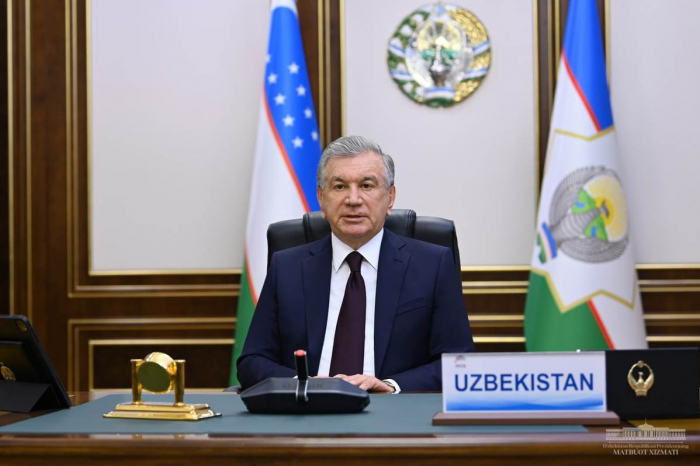Dr Mehmood Ul Hassan Khan
As usual, Western media and so-called human rights organizations have been disseminating false, fake and fictional news about some unpleasant events that occurred in the autonomous Karakalpakstan Republic.
It seems that Western schemers and propagandists have intentionally, raised planned confusion about Uzbekistan’s response against protesters and termed it harsh. However, it was not harsh but rather harmonious and appropriate to immediately achieve calmness and stability through peaceful means.
On the other hand, Uzbekistan’s President Shavkat Mirziyoyev initiated integrated sensible political steps to defuse increasing tensions among the misled people and the responsive state. He applied his crisis management model and successfully diverted destructive tendencies by promoting a series of friendly spells of meaningful dialogues with elderly persons, religious leaders, societal influencers, young people, women and students in the troubled zone of Nukus, Karakalpakstan.
Uzbekistan’s President Shavkat Mirziyoyev's crisis management model mitigated all negative sentiments and launched a massive but holistic drive of political reconciliation, reunion and unity by scrapping any changes in the Articles 70, 71, 72, 74, and 75 of the current constitution that would have spelt the so-called end to any form of local self-governance. Thus he decreed to maintain the status quo of Karakalpakstan.
It is praiseworthy that Shavkat Mirziyoyev was bold enough to visit the Karakalpakstan region at once and personally met with politicians, parliamentarians and people alike and tried to make bridges of trust, and respect and decency and filled the widening gaps.
In this context, while addressing a high official meeting, the President shared that various destructive external forces and enemies of socio-economic prosperity and political stability were the real culprits of provoking people.
In this connection, it seems that forces of darkness, destruction and deadly tendencies tried to sabotage caravans of political stability, economic sustainability and social harmony through their malicious goals aimed at undermining the peaceful situation in Uzbekistan. However, the crisis management model of Shavkat Mirziyoyev proved effective to dismantle their conspiracies through unlimited spells and acts of compassion, cooperation, coordination, collaboration and consensus.
His crisis management model proved lethal against general loot and enabled the administration to promptly and quickly respond to any evil plans.
President Mirziyoyev warned that global movers and shakers of power politics and merchants of uncertainty, and disharmony may again try to destabilize Uzbekistan for which he suggested that spirits of vigilance, resolution, peace and tranquillity should be further streamlined, systemized and strengthened. He advised that all local leaders should once again be well aware of the turbulent and difficult times.
According to the President, mass riots in Karakalpakstan have been prepared for years by foreign forces. He pinpointed goals of criminal external forces i.e. encroachment on the territorial integrity of Uzbekistan and the creation of an interethnic conflict.
He concluded that the Prosecutor General has been entrusted with the task of carefully and objectively investigating each case and giving a fair legal assessment of the actions of the incident participants.
President Shavkat Mirziyoyev while visiting Nukus, the capital of Karakalpakstan met with regional lawmakers and community representatives and strictly advised them to care the views of the local population into consideration in making the decision.
Uzbekistan's president blamed foreign forces for inciting unrest in the country’s autonomous Karakalpakstan republic, where some political unrest surfaced but the government’s timely and friendly measures achieved sanity. President Shavkat Mirziyoyev said the "unpleasant events were a source of anguish, and the top state prosecutor would conduct a thorough investigation.
Uzbek President Shavkat Mirziyoyev has signed an executive order introducing the state of emergency in Karakalpakstan for a very short period. Western human rights organizations started hue and cry about the Uzbek government’s purely administrative action against criminals.
To remove any confusion, Uzbek president Mirziyoyev personally spoke to the European Union chief and shared his country's efforts to control the uncertainty through humanistic modes. Even “Euronews” appreciated the efforts of the Uzbek government to bring positive and productive changes in the civil rights of the Karakalpakstan people.
Moreover, “Die Welt” upheld that president Mirziyoyev abandoned plans to limit the autonomy of Karakalpakstan after a rare public protest in the north-western region. It also highly appreciated political negotiation to resolve the situation.
Most of the regional as well as global mass media and TV channels like Nezavisimaya Gazeta, Izvestia, etc. highlighted the significance of the Uzbek president's reconciliatory makeover to defuse the tensions.
Economic development is being carried out in different parts of Karakalpakstan in terms of new road construction, food & energy security, water supply, new industries and an airport which vividly reflects Uzbekistan’s government balanced economic policies to further reduce regional disparities and promote socio-economic prosperity in the region.
Uzbek President Mirziyoyev initiated a grand open regional diplomacy and called many heads of the states and shared his government efforts to control the situation. All regional countries appreciated and supported his sincere political efforts to maintain peace and stability.
The Uzbek authorities said that people had been misled in a bid to seize local government agencies. Uzbek President has subsequently dropped plans to introduce constitutional amendments that would bring some positive changes in Karakalpakstan through the holding of a referendum.
Critical analysis reveals that Karakalpakstan is an autonomous republic within Uzbekistan and occupies the whole northwestern part of Uzbekistan. Karakalpakstan has an area of 166,590 km2 and a population of about 2 million people. The capital is Nukus where lots of economic development work is carried out to transform society and people alike.
Unfortunately, Karakalpakstan is mostly desert and is located in western Uzbekistan near the Aral Sea, in the lowest part of the Amu Darya basin, and is surrounded by desert. However, the Uzbek government under “New Uzbekistan’s Doctrine” has been striving hard to introduce many effective policies, programs and projects to lessen the hardship of nature and geography. A massive program of social development is being carried out to restore the Aral Sea desertification through integrated community development and the use of modern water conservation technologies.
To conclude, it seems that Central Asia Region has unfortunately become a new proxy war hub of the international establishment. The conspiratorial theories have once again become active to rendezvous the economic development and political stability of the entire region through sugarcoated pills of so-called human rights, women empowerment, child labour, politicization and democratization.
Notwithstanding, the Republic of Uzbekistan has been the hub of rigorous politicization and democratization since its inception and an imminent referendum would further strengthen democratic norms in the country. It would reverse the centuries-old political doctrine of “State, Society and People” to “People, Society and State” a paradigm shift.
Furthermore, the government of Uzbekistan has completely banned child labour in the country which is indeed a great transformation. It has one of the biggest women's empowerment in the region and beyond. It has the biggest political parties which have equal rights for any kind of political activity in the country. Media is free to express. Society is dynamic and its culture is diversified. That is why it is famous for its rich multiculturalism and ethnic diversity.
Uzbekistan’s President Shavkat Mirziyoyev has a unique crisis management model which has produced wonders of mutual trust, respect, accommodation, humanistic spirits, corporate transparency, political openness, and fair and free electioneering in the country.
The Economist London, many published reports of Asian Development Bank, IMF and World Bank have appreciated numerous structural reforms of President Mirziyoyev and termed it an “Emerging Economy” with huge potential for further liberalized economy, exports, digitalization of economy & state a last but not least capacity-building mechanism.
Undoubtedly, President Mirziyoyev has set a new rule for a game of conflict resolution, disharmony and disunity by setting a new doctrine of political accommodation and reconciliation in the region. Political difference is the height of modern democracy which should not be propagated as any violation of human rights.
The people of the Karakalpakstan region should not be easy prey to the misleading philosophies of the West. Socio-economic integration, political stability and social harmony are the right way to jointly move forward.
Dr Mehmood Ul Hassan Khan is a director at The Center for South Asia & International Studies (CSAIS).
More about:
















































